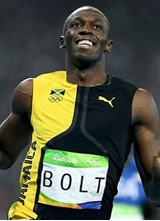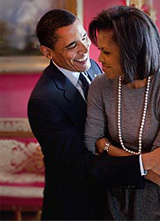The Legacy of
Usain Bolt
USAIN BOLT: THE SECRETS OF THE MAN WHO CHANGED SPORT FOREVER
 Usain Bolt has changed the face of
athletics across his unparalleled
career. His story has entered the
realms of legend, becoming one of athletics'
origin myths. A gangly sprinter from
humble beginnings bursts onto the scene
in Beijing, demolishing three world
records, as athletics crowns a new king.
Armed with the perfect concoction of
attributes — speed, swagger and an
unavoidably-excellent surname — Usain
Bolt has ruled the sport ever since.
Usain Bolt has changed the face of
athletics across his unparalleled
career. His story has entered the
realms of legend, becoming one of athletics'
origin myths. A gangly sprinter from
humble beginnings bursts onto the scene
in Beijing, demolishing three world
records, as athletics crowns a new king.
Armed with the perfect concoction of
attributes — speed, swagger and an
unavoidably-excellent surname — Usain
Bolt has ruled the sport ever since.
Tiger Woods, Michael Jordan, Michael
Phelps and Serena Williams are some of
the great names who have dominated
their sport with unerring intensity. But
Bolt, by contrast, is in his element clowning
around on the startline. How has the
sport's jester held the mental edge for
nine years in events that last a few fleeting
seconds? How can he stay so calm
when his legacy is one mistake from
unravelling? What is unique about the
mindset which has spurred him onto
unimaginable heights? And how on earth
can athletics prosper once the curtain
falls on Bolt's career?
"It is only when the starter says 'on
your marks' that I focus in on the race,"
Bolt exclusively tells Eurosport, as he
takes us inside the mind of a sporting
great. At 21:45pm on Saturday, August 5,
the starter uttered those words to the
Jamaican one final time in the last race of his incredible career.
The Saviour Of Sprinting
When Bolt thumped his chest in triumph
and eased to a jog even as he was
approaching the finish of the 100m final
in Beijing, not only was he making a
mockery of the Olympics’flagship event,
he was also ripping up the sprint manual
forever. Such was his impact that day,
athletics has marched to his beat ever
since. It was the first time in history that
a 100m sprinter had shown such disdain
for sprinting the full 100m and still oblit-
erated the world record. The combined
winning margins from Atlanta 1996 to
Athens 2004 sat at 0.18 seconds; Bolt's
9.69 in 2008 put him 0.2 seconds clear of
his closest rival. All on a nutritious diet
of chicken nuggets. ‘Anything can hap-
pen’ was a phrase now redundant in
men’s sprinting, all because of Bolt’s
extraordinary run-turned-victory-jog.
And boy did athletics need it. Fresh
from the debacle in Athens, which saw
proposed Olympic flame lighter
Konstantinos Kenteris' missed doping
test on the eve of the Opening Ceremony
set the tone for a drug-ravaged Games,
the sport needed rescuing — and it would
be, by the most eccentric of characters.
For five years, Bolt's dominance was
such that he could afford his pre-race the-
atrics, with only a solitary DQ in the
100m final at the World Championships
in Daegu, 2011, blighting his clean
sweep in major championships. Nobody
could get near him — and it defied all
logic. Sprinters were supposed to con-
form to a stereotype: muscular, explosive
and not far north of six foot. The start
was where the race was won and lost, so
what hope did Bolt have of harnessing
his surname and blasting from the blocks
with his 6'5" frame acting as a giant para-
chute?
Nothing could stop him in those early
years as he set about redefining a sport.
But as Bolt’s youth slipped away, so did
his frightening advantage. By the time
the 2015 World Championships arrived,
dissenting voices had emerged — so too
had a clear rival to the sport's golden boy:
the reviled double drug cheat Justin
Gatlin. For the first time in his career,
Bolt was under fire from inside and out-
side his sport. A race which took on a
moral dimension — almost becoming a
parable of good versus evil – had every-
thing riding on it, and Gatlin was in
imperious form, unbeaten in 29 races.
Not that you could tell. With his legacy
one defeat from crumbling, Bolt arrived
for the 100m final with his typical swag-
ger and looked completely relaxed as the
athletes were introduced to the crowd. It
wasn’t his raw pace that won the final,
but his mental hold on his rivals as Gatlin
—an Olympic gold medallist—forgot
how to run in the final 15m. This was no
fluke. This was the Bolt effect. Thinking
you can beat him, and actually beating
him, are two very different beasts. It is a
tension that his rivals have never been
able to resolve, a constant thread running
through his career.
The Swagger That Stunned Athletics
No one had ever seen anything like it. In
WWE, perhaps, but certainly not in ath-
letics. When Bolt lined up for the 100m
in Beijing in 2008 his rivals were taken
aback, as were fans around the world. It
was striking, almost shocking in a won-
derful way. His fellow sprinters were
focused, stern and unflinching while Bolt
preened like a peacock; he effectively
roared ‘Look! I've arrived! This is how
we do things now’. No athlete had ever
celebrated victory prior to a race so con-
vincingly before; no one had dared to
make the 100m a one-man party, only
interrupted very fleetingly by the main
event. The race itself was only a very
small part of a wider celebration, not
only of talent, but of personality.
Bolt had arrived, and his world-record
run was sandwiched between selfies,
lightning bolts and rampant, uninhibited
posing. It was how a young athlete might
play out their moment of triumph in front
of a full-length mirror while dancing for
joy. It played out like a dream for the
young Jamaican. He was the only one not
surprised by the swagger; he was the
only one not surprised by the success.
Athletics had been changed forever, all in
the space of 30 stunning, unforgettable
minutes.
"I’ve never seen anybody compete with
such a carefree attitude and a sense of
enjoyment, a celebration of his talent,"
triple jump world-record holder Jonathan
Edwards tells Eurosport. “For me that
makes him stand out as much as his tal-
ent in itself and what he’s achieved."
"It is just showing my personality,"
Bolt himself explains. "I did it a few
times and the crowd liked it so I kept
doing it. I love when a stadium has a lot
of energy, it inspires me to perform better."
It is for this reason that the swagger
doesn't grind, the posing doesn't drag,
because this is Bolt being completely
himself, the unbridled, unchecked version of himself. It's the authenticity of his
antics that makes them relatable for his
millions of fans, because this is how he
behaves around his friends and at home.
The opposite of being contrived and
designed for the cameras, he is simply
showing the world the real him.
The Legacy Of A Legend
"In athletics he is the greatest, and out-
side athletics he is up there with the leg-
ends of sport like Pele, Maradona and
Muhammad Ali," Mo Farah tells
Eurosport.
Boil down Bolt's career to the simple process of running and it's tough to agree with the assertion. Fourteen minutes and 28.83 seconds – the time Farah would take to plod through an unusually pedestrian 5,000m race – is the total time Bolt has spent on track during individual events at Olympic and World Championship level, dating from Athens 2004 to Rio 2016. Even if you include his relay exploits at a generous 10 seconds per race, Bolt's total input from 62 global heats and finals stretches to just 16 minutes and eight seconds. One sixth of a football match; barely five rounds in the ring.
True, Bolt has run sporadically in Diamond League meets, national championships and even the Commonwealth Games, but his brand was built in those 16 minutes – few care what happened in events in Doha and Kingston.
Unlike the giants of sport mentioned by Farah, though, every single second counted in Bolt's ascent to greatness. Pele's copybook was slightly stained by his inability to win a Golden Boot at the World Cup, as well as suffering injuries in 1962 and 1966; Diego Maradona was engulfed in drug and gun scandals and the 'Hand of God'; Muhammad Ali lost the 'Fight of the Century'. Those low-points were not legacy ending, but Bolt was never afforded the luxury of mini failures. Any mistake, any defeat, in a major final would have bitten at his aura – seven Olympic gold medals and a silver doesn't quite have the same ring to it. And it was a full complement of nine Olympic golds before his 2008 relay title was retroactively stripped from him due to Nesta Carter's positive drugs test.
Sure, Bolt showed fallibility with his disqualification in Daegu. But even that false start, his only failure in a major final post-2008, helped fuel a myth that the only man who could stop him was himself. With potential gains outweighed tenfold by the damage of defeat, Bolt's consistency under the most intense pressure has rarely been witnessed in sport. Nor has it been more welcome.
Bolt was anointed as the saviour of athletics after the turmoil of Athens 2004, a tough gig for anyone, let alone a prankster who was still coming to grips with his generation-defining talent. But bear the responsibility he did, proving a willing distraction to the seemingly ceaseless and damning doping stories sweeping the sport.
Every tale with a hero also needs a villain. Or villains, as it transpired in athletics, as Bolt's chief rivals Gatlin, Tyson Gay and Asafa Powell became boo boys due to their drug-blotted pasts. It was Bolt's head-to-head with the former that garnered most publicity, with Gatlin only too willing to play the role of Public Enemy No.1. The American's unapologetic stance may have sparked outrage, but it also inadvertently built a platform for Bolt to assert himself as athletics' riposte to cheating. And the Jamaican did exactly that, time and time again.
In fact, the minor blemish on Bolt's record is that he didn't push the world records further. If only he had squeezed in bonus races in the aftermath of Berlin 2009, praying for the optimal +1.9m/s tailwind, he may have pushed the world record further into uncharted territory: 9.4 seconds for 100m and sub-19 seconds for 200m both felt attainable in his pomp.
Perhaps it's selfish to want more, but that's the feeling that will spread around the London Stadium when the batons are retired following the men's 4x100m relay, his final event. PT Barnum was credited with coining the phrase, 'always leave them wanting more', and with Bolt the feeling will never be stronger. Athletics is losing its greatest entertainer.
Forget the medals and world records. If Bolt's legacy is anything, it's that he transformed a sport from stony-faced stares to cheeky grins – bringing the fans closer than ever. He introduced the concept of the after party, proving that the show can go on long after the race has finished. He's also crushed the notion that champions have to hold an omnipresent focus and be serious 24-7. His startline smile may be infectious, but it's also one of his most brutal weapons. It's message? 'No one can stop me.'
From the torso-beating kid to the ruthless-but-aging guardian, Bolt's impact – both on and off the track – has been rivalled by few. Farah is surely right: the Jamaican belongs among sport's greatest figures. After all, who else can boast of a golden career forged from a little over 15 minutes of foundations?
What Now For Athletics?
Don't ask. Just don't ask. It's the question athletics doesn't want to answer, and yet after the curtain falls on the World Championships in London, it somehow must. When Bolt and his friend Farah leave the track, an unmistakeable void will have been left in their wake. Bolt as he goes into retirement and Farah as he takes to the streets and focuses on marathons.
No one is more acutely aware of athletes' responsibilities to interact and engage with the very fans who make them superstars than the latter, who recognises that the after-race shows are as important as the pure running feats before them. "We grew up together in the sport so we have known each other for a long time," Farah adds to Eurosport. "I have seen the way he interacts with the fans and spends a lot of time signing autographs, taking selfies etc. which is something that we as athletes have a responsibility to do.”
Bolt could not agree more about the value of personality and giving the fans what they want: winning, then performing. In surprisingly blunt terms, Bolt made it abundantly clear to his sprinting heirs what will be demanded of them, in addition to simply running fast.
"I've said to a few athletes that I know personally, 'You guys need to show your personality, not just performance," Bolt said in February. "Listen to me, I'm not trying to say you should try and do weird things, but people want to see personality and something different. Hopefully they'll trust me and try to change. I said to de Grasse last season, 'Listen to me, yes you're doing well, but you guys are too quiet. Look at the attention you got because we were having fun.' People were like, 'De Grasse is so cool'."
Edwards insists there is no debate about Bolt's greatness, both as an athlete and a superstar – and athletics will be left reeling by his departure from the sport.
"Bolt is as big of a name as Ronaldo or Messi without any question"
"Certainly, he is the greatest ever – I don’t think anyone could dispute that," concludes Edwards. "In my view he is, and not just because of his performances but also for what he brings to the sport with his personality. You would have to put him along with the likes of [Cristiano] Ronaldo, [Lionel] Messi, Neymar – the most popular sportsmen in the world. Bolt, by the force of not only his performances but also his personality, is as big of a name as Ronaldo or Messi without any question. Probably the only other athlete who has been in his league was Carl Lewis, at a time when athletics was maybe vying with football as the number one sport. Athletics is very lucky to have him."
So where does this leave athletics, with its most decorated and celebrated star leaving the fray? Edwards adds: "You do wonder where athletics would be without him – he is a shining light. I don’t think there’s another Bolt out there, someone who could grab the world’s attention in the way that he did, not that I see at the moment – even though there are some very, very talented athletes. Competition is obviously great for sport, but there is something about seeing a dominant champion who is almost superhuman."
Bolt says he thrives on his status as the greatest athlete the world has ever seen. "It gives me confidence. I have worked hard for all that I have achieved and it is always great to get recognition for my achievements."
There may never be an athlete who achieves such dominance on the track and adoration off it, but maybe that is okay. With the dominant champion, who is almost superhuman, leaving the stage, perhaps it is time for true competition to return to the world's biggest races, for unpredictability to replace the wonder of celebrating a single man's greatness. The fear for athletics, though, is that sport is now more focused on individuals than ever before.
The criteria has never been greater as
athletics shops for its next global super-
star. Legendary performances, undisput-
ed greatness and a uniquely unforget-
table personality: that is where Bolt has
set the bar. There is no doubt that he has
changed an entire sport; there is no doubt
that he is the greatest athlete of all time.
He is an impossible act to follow, with
his mentality, his personality and his
absurd accomplishments... but then his
legacy would not be nearly as special if
it were.







 Caribbean Corruption Report... Click here
Caribbean Corruption Report... Click here The Legacy of Usain Bolt - Click here
The Legacy of Usain Bolt - Click here





 Stopped by ICE:
Stopped by ICE: